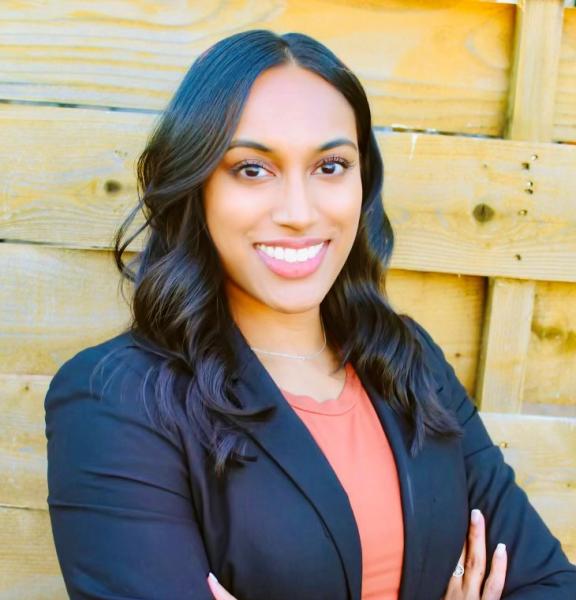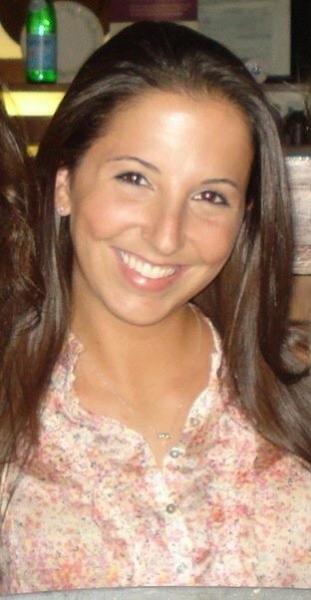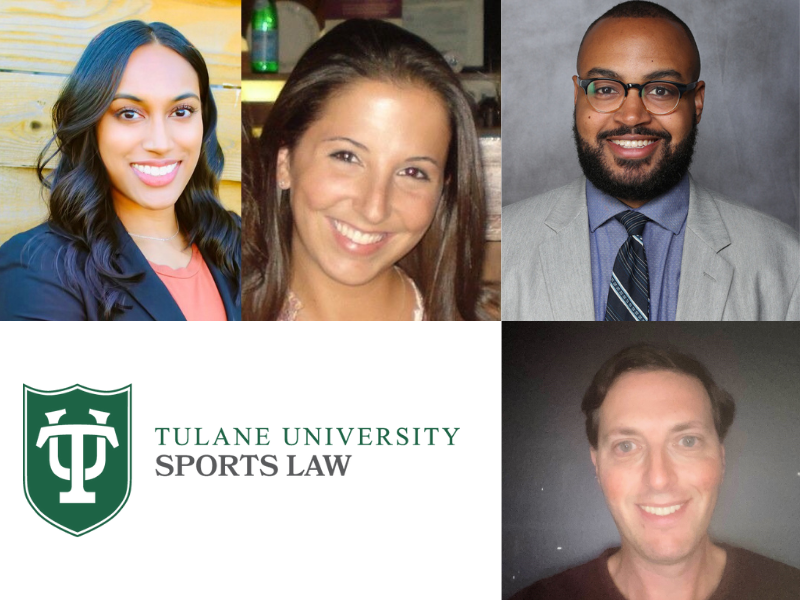Sports Law Alumni: Where are they now?
Landing the dream job in sports is the final and perhaps most exciting prospect of our Sports Law students’ law school career. The last year of law school includes an exhaustive amount of time in job interviews and networking, in preparation for the next step to a sports career. We caught up with Tulane Sports Law graduates Chelsey Antony (L ‘19), Emma Barnett (L ’12), Chris Robinson (L ’18), and Jaimie Wolf (L ’01) to see where their law careers have taken them.
Chelsey Antony (L ‘19)Business and Legal Affairs, Corporate Counsel for NFL Players, Inc
1) What do you do in your new position at the NFLPA?
Currently, I have a hybrid role in the for-profit licensing and marketing arm of the NFLPA. Quite literally, this means I focus on revenue generation, creating new business verticals, and group player licensing on the business side as well as all the transactional work, risk mitigation, and contract drafting and negotiating that happens on the legal side of that. This role is nothing like others I have seen or been in before (at the team side at-least). It is a bit complex and unique, but it is also a lot of fun with space to grow as a lawyer and a businesswoman. At the most basic level, what I do on a daily basis is work for all 2,000+ NFL players in their business and legal needs both on and off the football field (e.g., touching all areas such as NFTs, NIL, alcohol, gambling, apparel, merchandising, consumables, marketing, promotions, endorsements, etc.). These guys are entrepreneurs, activists, philanthropists, businessmen, and so much more than just football players. I really get to see that and help drive all sides of them while constantly advocating for our players, and against those that might be trying to take advantage of them.
2) How did your Tulane Law degree help you in your journey?
Tulane Law was instrumental in my journey. Ever since a former mentor of mine told me he attended Tulane for Law School, I was sold! The connections and mentorship I received from Tulane were incredibly eye opening. Not to mention The Tulane Sports Law Society, Professor (Gabe) Feldman's guidance, and the many internships I received simply from having "Tulane" on my resume. In fact, my first job out of law school was thanks to a former Tulane alumni and mentor of mine who reached back and gave me the opportunity to start as a young lawyer in sports. Tulane will always have a place in my heart , and so will this sports law family and the city of New Orleans.
3) What is your advice for students looking to get into sports law?
Don't give up. You will fail. A lot. You will get rejected. A lot. And almost everyone will tell you to go the law firm route first or that you need to be the number one ranked student in your class. You don't. You need a few things, but I will share four (a few of which I have adopted from Anna Wintour- EIC of Vogue):
(1) Talent - you need to be good at what you do no matter how bad you want it (be a good lawyer first, or a good business person, or salesman, whatever it is, you can't just want it, you also need to back it to some extent - so hone those skills first and foremost);
(2) Instinct - you need to trust your instinct above all else - this is what makes you, you! Sounds cliche, but the working world does not want copy/paste humans...add your flair! It goes a long way when done right;
(3) Heart - or Passion - you need to love, and I mean genuinely and truly love and have a deep passion and heart for what you WANT to do, not because it sounds cool, or you would be the ones getting your friends tickets to games, or because you think it’s a fun job. Yes, it is all of those things, but the people I have seen that are so successful or work in sports either stumbled upon it by virtue of their talent or drove their entire heart the entire way to get where they are now; and
(4) Genuinely network - expand your connections and network in an authentic way. It is so easy to tell who is reaching out in hopes to get a job versus who is reaching out to get to know you as a lawyer and a person and then just be in your corner so that you think of them when the job opportunity comes and not the other way around.
Emma Barnett (L ’12)SVP, CLEAR
1) What do you do in your new position at CLEAR?
CLEAR recently completed its IPO (July 2021) and my position was created to support all of its needs as a publicly-listed company. More specifically, I am managing CLEAR's NYSE/SEC compliance, public company disclosure, and Board/Committee and general governance matters.
2) How did your Tulane Law degree help you in your journey?
 My Tulane Law degree helped me in so many ways, it would be hard to truly do it justice in this feature, but I will try! Of course the high-quality education I received at Tulane Law is the foundation of my skills and my practice. But the distinction of going to school in New Orleans and pursuing the Sports Law program is something that stands out/is a topic of discussion that consistently helps me distinguish myself from other well-educated and successful individuals. The Sports Law program specifically provided me with such unique opportunities as well, including working for an NBA team and working as a Graduate Assistant. Those opportunities are not only interesting to chat about, but taught me skills I still utilize today, including a broad understanding of the sports and entertainment industry, balancing legal and business needs, etc.
My Tulane Law degree helped me in so many ways, it would be hard to truly do it justice in this feature, but I will try! Of course the high-quality education I received at Tulane Law is the foundation of my skills and my practice. But the distinction of going to school in New Orleans and pursuing the Sports Law program is something that stands out/is a topic of discussion that consistently helps me distinguish myself from other well-educated and successful individuals. The Sports Law program specifically provided me with such unique opportunities as well, including working for an NBA team and working as a Graduate Assistant. Those opportunities are not only interesting to chat about, but taught me skills I still utilize today, including a broad understanding of the sports and entertainment industry, balancing legal and business needs, etc.
3) What is your advice for students looking to get into sports law?
There are so many paths in the world of "sports law" that you can pursue, go in with an open mind. Not everyone would agree with me, but I think that the foundational skills you learn working for a law firm are incredibly helpful and will give you a certain "credibility" for the rest of your career. While many people want to jump right into working for a team/league/agent, that is not the only way, and it is worth at least thinking about if the law firm path can add value to your future goals/aspirations. While it is preferable to go to a firm and work on a translatable skill set, ultimately being a good lawyer is about issue spotting and problem solving--you can learn rules and regulations that are specific to other areas of law relatively easily as long as you have strong underlying skills--and a law firm is a great place to learn a lot of foundational skills.
Chris Robinson (L ’18)Basketball Strategy Associate, Utah Jazz
1) What do you do in your new position at the Jazz?
I ensure compliance with the Collective Bargaining Agreement and NBA Salary Cap, as well as provide research and support to help senior team officials make informed basketball decisions. Recently, I have projected salaries for players in Free Agency, identified trade targets and ensured financial execution, and helped the organization comply with various league rules.
2) How did your Tulane Law degree help you in your journey?
Tulane Law School provided me not only with an analytical skillset to help me think critically, but also an unmatched alumni network that helped bring me into the league. Tulane Law has placed a remarkable number of alumni in NBA front offices, including: Jon Phelps (L’12, Detroit Pistons), Andrew Baker (L’15, Dallas Mavericks), Marshall Rader (L’15, Los Angeles Lakers), Onsi Saleh (L’17, Golden State Warriors), Tim Edwards (L’18, former Indiana Pacers), and Chelsey Antony (L’19, former Philadelphia 76ers). Baker in particular gave me my first shot with the Brooklyn Nets, and I’ve been able to lean on all of them – both as a student, and as a professional –, and they have one way or another helped advance my career development. We all maintain our connection to the school by judging the Tulane Pro Basketball Negotiation Competition, where we help groom the next generation of NBA Front Office professionals – a fantastic opportunity that is totally unique to Tulane.
3) What is your advice for students looking to get into sports law?
Find like-minded students, forge relationships, and stick together. If you want a non-traditional job out of law school, you’ll need to take a non-traditional path while in law school. Relevant skills and internships may be more helpful to your career than a judicial clerkship, and that’s okay. Having a tight-knit group of people around me to keep me focused on my goal of working in an NBA front office helped keep me grounded and was incredibly helpful throughout my journey. Three of my closest friends from law school also have jobs in the sports industry now, and I wouldn’t have survived without them.
Jaimie Wolf (L ’01)VP Legal, PointsBet
1) What do you do in your position at PointsBet?
 PointsBet is a leading mobile sports wagering and iGaming operator. Founded in 2015 in Australia, PointsBet entered the U.S. market in January 2019 and has rapidly expanded across the country since then. I oversee a team of four that respond to all day-to-day legal issues the company may experience related to its U.S. operations (and provide support to the Australian and Canadian-based legal teams when needed). We work across and with all departments, such as compliance, product and tech, advertising and marketing, human resources and finance. In addition, as part of the management team, I offer advice and counsel on a range of strategic initiatives to help identify and avoid potential legal risks and obstacles.
PointsBet is a leading mobile sports wagering and iGaming operator. Founded in 2015 in Australia, PointsBet entered the U.S. market in January 2019 and has rapidly expanded across the country since then. I oversee a team of four that respond to all day-to-day legal issues the company may experience related to its U.S. operations (and provide support to the Australian and Canadian-based legal teams when needed). We work across and with all departments, such as compliance, product and tech, advertising and marketing, human resources and finance. In addition, as part of the management team, I offer advice and counsel on a range of strategic initiatives to help identify and avoid potential legal risks and obstacles.
2) How did your Tulane Law degree help you in your journey?
While at Tulane Law, I not only earned my law degree but also the Certificate of Specialization in Sports Law. Having both a degree from a highly-respected school as well as “proof” of my focus and commitment to working in sports prior to being able to develop an appropriate professional record undoubtedly helped me early in my career. I was fortunate to receive an opportunity to join the legal team of an NHL team (the New York Islanders) very early in my career and strongly believe that both of these items helped distinguish me from other candidates. The opportunity with the New York Islanders was the first step in what resulted in close to 15 years of in-house work for several professional sports teams. In December of 2020, I left the team side to join PointsBet, and my deep experience working with the various teams and leagues was important given that we work with many of these same entities and folks to ensure that we have the relationships and contracts in place to offer and promote our full range of markets.
3) What is your advice for students looking to get into sports law?
Don’t wait for an opportunity to fall into your lap. Reach out and network with alumni and other individuals who you are interested in speaking with to learn more about their path into the industry. I frequently reach out to recommend individuals who I have had an opportunity to speak with when I learn that they have applied to a position where I may know a member of the legal team. Also, keep in mind that it might take some time to find that first opportunity. Don’t be discouraged as the landscape is very competitive but always keep your goals in mind as you develop your practice and figure out how what you are currently doing can make you a stronger candidate for the role you are ultimately looking for.

